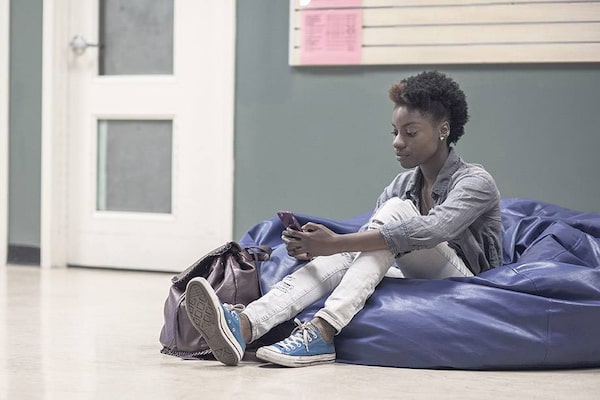
Six per cent of the youth who used Kids Help Phone's text service last month disclosed that they were Black, even though Black people account for just 4.3 per cent of Canada’s population.
Kids Help Phone is launching a new initiative, RiseUp, that aims to provide more culturally informed and accessible mental-health services to Black youth across the country.
The services include free wellness support that Black youth can access 24/7 by texting RISE to 686868, the Kids Help Phone number.
“When youth text RISE to that number, they will be paired with a crisis responder that knows the youth is Black and can give them services that are tailored to them,” said Barbara Ukwuegbu, the manager of Black youth initiatives at Kids Help Phone.
Of all the young people that used the charitable organization’s text services last month, 6 per cent disclosed that they were Black, even though Black people account for just 4.3 per cent of Canada’s population, according to the organization.
Through the initiative, the charity is adding 200 Black community resources to its online database, increasing its number of African, Caribbean and Black employees and recruiting more than 100 Black volunteers as crisis responders each year.
This is a continuation of efforts that began in 2021 to support Black youth facing mental-health challenges, Ms. Ukwuegbu said. In August that year, the charity consulted more than 200 Black youth on how services could be better tailored to them.
“What we heard is that more Black youth were looking for resources meant specifically for them. Services meant for Black people and provided for Black people,” Ms. Ukwuegbu said.
Program for young hockey players aims to change the culture of the sport
Crisis responders – volunteers that answer Kids Help Phone text lines – make up a large part of the charity’s services. In 2022, Kids Help Phone reported 224,948 texting sessions with young people across Canada. A large part of this new initiative is making sure kids have access to Black crisis responders who may have a better cultural understanding of their needs.
In a 2018 survey of Black Canadians by the Mental Health Commission of Canada, 60 per cent of respondents said they would be more willing to use mental-health services if the mental-health professionals were Black, while 95.1 per cent said the underutilization of mental-health services by Black Canadians was an issue that needed to be addressed.
“I think for a long time people thought it was only the stigma that kept Black youth and people away from mental-health services, but actually a lot of it is that people don’t know where to go,” said Kwame McKenzie, a professor of psychiatry at the University of Toronto and the director of health equity at the Centre for Addiction and Mental Health (CAMH).
Dr. McKenzie says the barriers Black people face to access adequate help – whether as young people or adults – are more nuanced than stigma or a lack of services. He says that, in most cases, the services, doctors and professionals available for them are incapable of dealing with the issues Black youth bring to them.
Duane Wiafe, a registered social worker and psychotherapist based in Woodstock, Ont., shares those sentiments. In his own practice, he says many Black youth facing challenges at school, with the law or at home can become frustrated when the mental-health supporters assigned to them don’t look like them or understand them.
“It can actually be retraumatizing for Black youth to seek help and then be met with a social worker or psychiatrist that they see as another authority figure that does not and is not willing to understand them,” Mr. Wiafe said.
Ms. Ukwuegbu says that by adding more Black employees and crisis responders, trained in culturally informed and equitable mental-health support to Kids Help Phone, RiseUp will provide a space for Black youth to get anonymous help from people who might better understand their situations and experiences.
“Sometimes all a kid needs is someone to speak to, to validate them and to really listen to their experience,” she said.